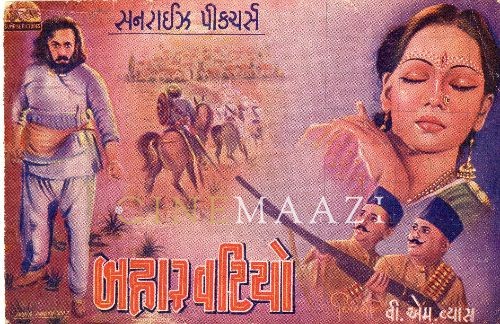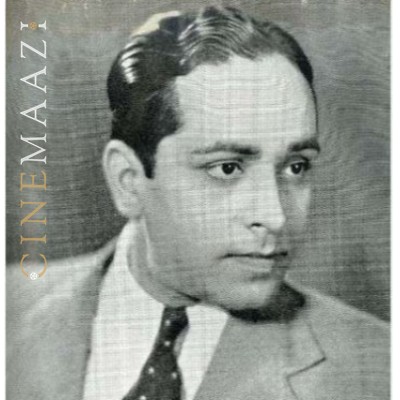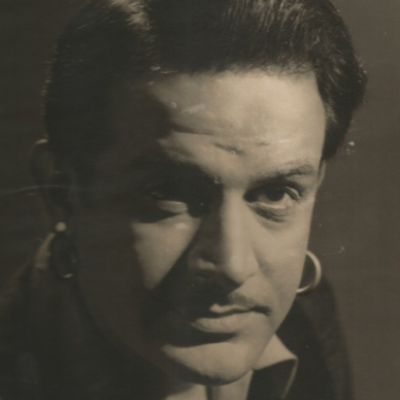This section is for paid subscribers only. Our subscription is only $3700/- for one full year.
You get unlimited access to all paid section and features on the website with this subscription.
Subscribe to read full article
This section is for paid subscribers only. Our subscription is only $37/- for one full year.
You get unlimited access to all paid section and features on the website with this subscription.
Not ready for a full subscription?
You can access this article for $2, and have it saved to your account for one year.
- Release Date1947
- FormatB-W
- LanguageGujarati
Kathiawar, the land of so many native states, abounds with the stories of several outlaws after a strenuous research on their lives and exploits, by our eminent author Zaverchand Meghani. These Kathiawar outlaws valued their right perspective, and since then they are loved and respected for their honesty, for the guts and courage to fight out the injustice and evil and for the cultural trend they have shown during their outlawry. They are popular heroes amongst the masses and at the tip of everybody’s tongue.
Our screenplay revives the life story of such an outlaw. Davubha, who was a Kshatriya by birth, and a peaceful citizen in a small native state. Mohabat Singh the Minster, was ruling over the state with an autocratic air. His wish was being executed at the risk of persecution. His moral life has sacrificed the purity of so many families and was an ever present menace to his people and Mehak, the young daughter of purohit Shankar Maharaj, was the next unfortunate victim, whom this wicked minister was trying to procure to satisfy his physical hunger and when his persuasive attempts failed in winning over that cultured girl, he started persecuting her. Accusing falsely, Mahek and her bethrothed husband Mohan, of smuggling the opium, he jailed both of them and her old father Shankar Purohit was murdered brutally. The royal blood in Devubha could not bear this brutality, and promised the dying Purohit to get redressed this gross injustice.
Devubha, and his comrades, encountered with severe punishment, when they went to the royal court to seek justice, but thanks to the kind hearted wife of Mohobat Singh, who was once saved by Devubha. His land and estates were confiscated, he was exiled, and to add to this agony, his wife expired driving Devubha mad with righteous anger.
This cycle of incidents, were enough to trigger the outlawry in the veins of a just and peaceful citizen like Devubha. He, with his son-in-law Merubha, and comrades, challenged the state as outlaws, and in the first instance released Manek and Mohan to marry them as per his promise to dying purohit, but unfortunately before that Mohan was shot dead by Mohabat Singh. Not being disheartened, he tried to marry her to the son of royal purohit, but as Mahek was unwilling, owing to her genuine love for the dead Mohan, he had to dismiss the idea.
When Mohabat Singh was captured by Devubha, and was on verge of being butchered, he was saved by his wife Rajba, who was sisterly to Devubha: but a villain is always a villain unless he is hardpressed with the facts: Mohabat Singh was a born villain, and so after so much gratitude showered on him, he could not imbibe the spirit of mercy and his nature revolted and reacted with more venom, and pushed himself to devise all the means and ways to harass, persecute and banish Devubha and forcefully tried to submit Mahek to his wishes, but in the end he was fortunate enough to be killed by his own pious wife Rajba. Devubha, also was killed during a fight, and fulfilled his promise, but it was different from the other death, in the sense that it was a noble sacrifice.
There are innumerable instances, in the story which shows the moral stature of our Devubha. In one of them, it was shown that, when they had been on a raid of a village and when his son-in-law Merubha, during the raid, tried to molest the chastity of a young married daughter of a businessman, he was shot dead instantaneously by Devubh
The screenplay is also sprinkled with the light showers of the humorous exploits of the pair, Fulasingh Fojdar and Jetho Jamadar.
[From the official press booklet]

Cast
Crew
-
BannerSunrise Pict, Bombay
-
Director
-
Producer
-
Music Director
-
Lyricist
-
Story Writer
-
Dialogues
-
Cinematography
-
Editing
-
Sound Recording/ Audiography
-
Make-up
-
Art Direction











.jpg)



